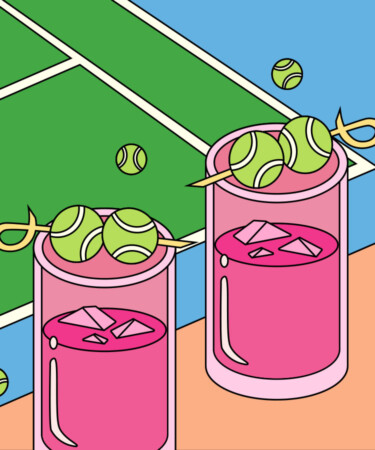Every year, the U.S. Open gets a lot of chatter for its chicly-dressed spectators, celebrity attendees, and, of course, its world-class tennis. But in recent years, a more niche facet of the three-week tournament has strengthened its grip on not just those in the stands, but all of New York City: the Honey Deuce.
The cocktail first made its debut at the USTA Billie Jean King National Tennis Center in 2006 when Grey Goose — a sponsor of the open — consulted hospitality pro and cocktail book author Nick Mautone for assistance developing a signature serve. The result was the vodka, lemonade, and raspberry liqueur cocktail garnished with three honeydew melon spheres that many know and love today.
Signature cocktails for sporting events are nothing new. Every April, everyone who attends the Masters drinks Azaleas in the Augusta, Ga., heat. In early July, patrons line the stands of Wimbledon with Pimm’s Cups in hand to see who will clinch the winner’s title. In most cases, the popularity of these signature drinks is limited to the events for which they are famous. But is the Honey Deuce finally poised to break out beyond the confines of the stadium?
Since the U.S. Open returned to full spectator capacity in 2021, the Honey Deuce has been on a steady incline within the confines of the Billie Jean King National Tennis Center. In 2022, 400,000 Honey Deuce cocktails were sold to thirsty patrons. Last year, that number jumped to well over 550,000. Its popularity at the Queens tournament is exactly what inspired bars like Jac’s on Bond, Dante, and Undercote to serve house-made iterations of the cocktail to their guests.
While there’s no denying the Honey Deuce’s popularity at the tournament and around New York City, this year, this drink feels uniquely positioned to break out. Why? Because it’s basically just a vodka lemonade, a.k.a. one of the most trending flavors in beverage alcohol right now.
The lemonade flavor trend can, in many ways, be viewed as an extension of the hard tea trend and the subsequent proliferation of half-and-half flavors. But it wasn’t until the spring of 2025 that it truly started taking shape with a few key players ready to get in on the action.
Surfside, a lineup of hard tea and lemonade founded in 2022, is one of those players. Between 2023 and 2024, the Philadelphia-based brand increased case sales from 1.2 million to 4.9 million, and while teas have historically accounted for most of those sales, things look markedly different this year. In April, Surfside’s vice president of national accounts Bobby Bilicki told Beer Business Daily that Surfside’s vodka lemonade variety pack was on track to become the brand’s top-selling SKU by mid-summer.
In the wake of Surfside’s massive successes, other brands have hopped onto the trend as well. That same month, Anheuser-Busch, Boston Beer Company, and E. & J. Gallo announced the launch of their own vodka-spiked canned lemonades in the form of Skimmers, Sun Cruiser, and Lucky One Lemonade, respectively.
Included in the flavor packs of both Surfside Lemonade and Lucky One Lemonade? A raspberry flavor — just like the Honey Deuce.
Search volume for the Honey Deuce has also been steady on the incline. Google searches for the term more than doubled between 2023 and 2024. Since mid-July 2025, search interest for the cocktail has already seen a spike, perhaps indicating that 2025 will be the biggest year for the cocktail yet.
Does the Honey Deuce have what it takes to take home the trophy? Only time will tell. This year’s U.S. Open kicks off on Sunday, Aug. 24.
